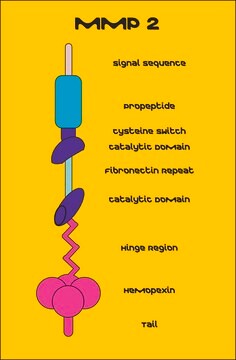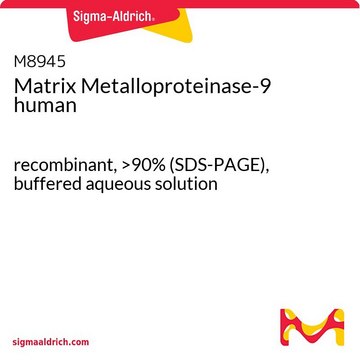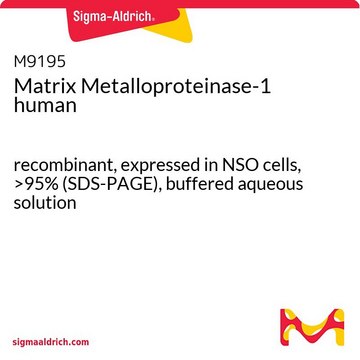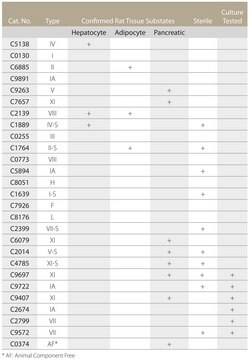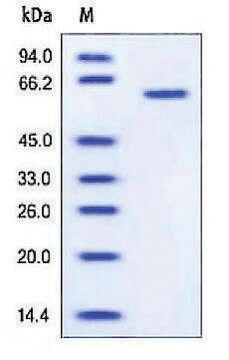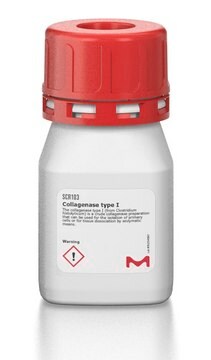Wszystkie zdjęcia(1)
Kluczowe dokumenty
M9445
Matrix Metalloproteinase-2 from mouse
recombinant, expressed in NSO cells, >95% (SDS-PAGE), buffered aqueous glycerol solution
Synonim(y):
Collagenase Type IV 72 kDa, Gelatinase 72 kDa, Gelatinase A, MMP-2
Zaloguj sięWyświetlanie cen organizacyjnych i kontraktowych
About This Item
Polecane produkty
rekombinowane
expressed in NSO cells
Poziom jakości
Próba
>95% (SDS-PAGE)
Formularz
buffered aqueous glycerol solution
masa cząsteczkowa
apparent mol wt ~72 kDa
Warunki transportu
wet ice
temp. przechowywania
−20°C
informacje o genach
mouse ... Mmp2(17390)
rat ... Mmp2(81686)
Opis ogólny
Matrix Metalloproteinase-2 (MMP-2) also known as gelatinase or type IV collagenase is a 72kDa protein. MMP-2 is a member of matrix metalloproteinase (MMP) family of enzymes. Basic structure of MMP2 contains signal peptide domain that targets the enzyme for secretion, the pro-peptide domain, which is removed when the enzyme is activated and the catalytic site containing gelatin-binding domain.
Specyficzność
The amino acid sequences 1-662 of the proenzymes of MMP-2 are identical between mouse and rat.
Zastosowanie
Matrix metalloproteinase-2 (MMP2) human has been used as a standard in zymography to measure proteolytic activity of MMP-2.
Działania biochem./fizjol.
MMP-2 degrades general matrix components and may have a role in processes such as host defense, cell proliferation, and protein turnover as well as tissue remodeling.
Matrix Metalloproteinase-2 (MMP-2) cleaves gelatin, type IV, V, VII, X, and XI collagens, fibronectin, elastin, laminin, proteoglycans and a range of non extracellular matrix (ECM ) components. MMP-2 cleaves native type I collagen to N-terminal ¾ and C-terminal ¼ fragments identical to those generated by interstitial collagenases. MMP2 and MMP9 play an essential role in matrix degradation and they are implicated in the maintenance of neovascularization. In mice, deletion or inhibition of MMP2 protects against myocardial rupture.
Postać fizyczna
Supplied as a 0.2 μm filtered solution of 25 mM Tris, pH 7.5, 5 mM calcium chloride, 75 mM sodium chloride, 0.025% Brij® 35 and 50% glycerol.
Komentarz do analizy
The biological activity is measured by its ability to cleave a fluorogenic peptide sustrate.
Informacje prawne
Brij is a registered trademark of Croda International PLC
Ta strona może zawierać tekst przetłumaczony maszynowo.
Kod klasy składowania
12 - Non Combustible Liquids
Klasa zagrożenia wodnego (WGK)
WGK 2
Temperatura zapłonu (°F)
Not applicable
Temperatura zapłonu (°C)
Not applicable
Środki ochrony indywidualnej
Eyeshields, Gloves, multi-purpose combination respirator cartridge (US)
Wybierz jedną z najnowszych wersji:
Masz już ten produkt?
Dokumenty związane z niedawno zakupionymi produktami zostały zamieszczone w Bibliotece dokumentów.
Klienci oglądali również te produkty
Gelatinase A
Murphy, G. et al.
Handbook of Proteolytic Enzymes, 497-503 (2004)
INHIBITION OF GELATINASE ACTIVITY OF
MMP-2 AND MMP-9 BY EXTRACTS OF Bauhinia
ungulata L. Kamilla.
MMP-2 AND MMP-9 BY EXTRACTS OF Bauhinia
ungulata L. Kamilla.
Bioscience Journal, 31, 584-590 (2015)
Inhibition of Gelatinases by Vegetable Extracts
of the Species Tapirira guianensis
(Stick Pigeon).
of the Species Tapirira guianensis
(Stick Pigeon).
Longatti T R
British Journal of Pharmaceutical Research, 1(4), 133-140 (2011)
Immunohistochemical expression of MMP-14 and MMP-2, and MMP-2 activity during human ovarian follicular development.
Vos MC
Reproductive Biology and Endocrinology, 12:12 (2014)
P Reponen et al.
The Journal of biological chemistry, 267(11), 7856-7862 (1992-04-15)
We report the isolation of a cDNA clone providing the first and complete sequence of mouse 72-kDa type IV collagenase. The clone contains 2800 nucleotides with a 1986-nucleotide open reading frame coding for 662 amino acids. The amino acid sequence
Nasz zespół naukowców ma doświadczenie we wszystkich obszarach badań, w tym w naukach przyrodniczych, materiałoznawstwie, syntezie chemicznej, chromatografii, analityce i wielu innych dziedzinach.
Skontaktuj się z zespołem ds. pomocy technicznej


